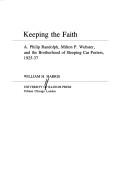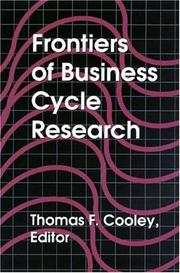| Listing 1 - 6 of 6 |
Sort by
|

ISBN: 9780252004537 0252004531 Year: 1977 Publisher: Urbana: University of Illinois press,
Abstract | Keywords | Export | Availability | Bookmark
 Loading...
Loading...Choose an application
- Reference Manager
- EndNote
- RefWorks (Direct export to RefWorks)
Book
ISBN: 1282941577 9786612941573 0252090063 9780252090066 9781282941571 661294157X 9780252035753 9780252077647 0252077644 0252035755 Year: 2010 Publisher: Urbana
Abstract | Keywords | Export | Availability | Bookmark
 Loading...
Loading...Choose an application
- Reference Manager
- EndNote
- RefWorks (Direct export to RefWorks)
Civil rights workers --- Civil rights movements --- African Americans --- History --- Civil rights --- Randolph, A. Philip --- United States --- Race relations.
Book
ISBN: 0814764649 0814724477 9780814724477 9780814764640 9780814785942 0814785948 Year: 2015 Publisher: New York, NY : New York University Press,
Abstract | Keywords | Export | Availability | Bookmark
 Loading...
Loading...Choose an application
- Reference Manager
- EndNote
- RefWorks (Direct export to RefWorks)
Atone time, Asa Philip Randolph (1889-1979) was a household name. As president ofthe all-black Brotherhood of Sleeping Car Porters (BSCP), he was an embodimentof America’s multifaceted radical tradition, a leading spokesman for BlackAmerica, and a potent symbol of trade unionism and civil rights agitation fornearly half a century. But with the dissolution of the BSCP in the 1970s, theassaults waged against organized labor in the 1980s, and the overall silencingof labor history in U.S. popular discourse, he has been largely forgotten amonglarge segments of the general public before whom he once loomed so large.Historians, however, have not only continued to focus on Randolph himself, buthis role (either direct, or via his legacy) in a wide range of social,political, cultural, and even religious milieu and movements. The authors of Reframing Randolph have taken Randolph’s dusty portrait down fromthe wall to reexamine and reframe it, allowing scholars to regard him in new,and often competing, lights. This collection of essays gathers, for the veryfirst time, many genres of perspectives on Randolph. Featuring both establishedand emergent intellectual voices, this project seeks to avoid both hagiographyand blanket condemnation alike. The contributors represent the diverse waysthat historians have approached the importance of his long and complex careerin the main political, social, and cultural currents of twentieth-centuryAfrican American specifically, and twentieth-century U.S. history overall. Thecentral goal of Reframing Randolph isto achieve a combination of synthetic and critical reappraisal.
African Americans --- African American labor leaders --- Civil rights workers --- Afro-American labor leaders --- Labor leaders, African American --- Labor leaders --- Civil rights --- History --- Randolph, A. Philip --- Randolph, Asa Philip, --- Influence.

ISBN: 1479899380 9781479899388 0814782876 9780814782873 Year: 2006 Publisher: New York : New York University Press,
Abstract | Keywords | Export | Availability | Bookmark
 Loading...
Loading...Choose an application
- Reference Manager
- EndNote
- RefWorks (Direct export to RefWorks)
A. Philip Randolph, founder of the Brotherhood of Sleeping Car Porters, was one of the most effective black trade unionists in America. Once known as "the most dangerous black man in America," he was a radical journalist, a labor leader, and a pioneer of civil rights strategies. His protegé Bayard Rustin noted that, "With the exception of W.E.B. Du Bois, he was probably the greatest civil rights leader of the twentieth century until Martin Luther King."Scholarship has traditionally portrayed Randolph as an atheist and anti-religious, his connections to African American religion either ignored or misrepresented. Taylor places Randolph within the context of American religious history and uncovers his complex relationship to African American religion. She demonstrates that Randolph’s religiosity covered a wide spectrum of liberal Protestant beliefs, from a religious humanism on the left, to orthodox theological positions on the right, never straying far from his African Methodist roots.
African Americans --- Civil rights --- Religion and politics --- African American labor leaders --- Civil rights workers --- Afro-American labor leaders --- Labor leaders, African American --- Labor leaders --- Political science --- Politics, Practical --- Politics and religion --- Religion --- Religions --- Basic rights --- Civil liberties --- Constitutional rights --- Fundamental rights --- Rights, Civil --- Constitutional law --- Human rights --- Political persecution --- Religion. --- Religious aspects --- Political aspects --- Law and legislation --- Randolph, A. Philip --- Randolph, Asa Philip,
Book
ISBN: 025209655X 9780252038624 9780252096556 0252038622 Year: 2014 Publisher: Urbana
Abstract | Keywords | Export | Availability | Bookmark
 Loading...
Loading...Choose an application
- Reference Manager
- EndNote
- RefWorks (Direct export to RefWorks)
"Scholars regard the March on Washington Movement (MOWM) as a forerunner of the postwar Civil Rights movement. Led by the charismatic A. Philip Randolph, MOWM scored an early victory when it forced the Roosevelt Administration to issue a landmark executive order that prohibited defense contractors from practicing racial discrimination. Winning the War for Democracy : The March on Washington Movement, 1941-1946 recalls that triumph, but also looks beyond Randolph and the MOWM's national leadership to focus on the organization's evolution and actions at the local level. Using personal papers of MOWM members such as T.D. McNeal, internal government documents from the Roosevelt administration, and other primary sources, David Lucander highlights how local affiliates fighting for a double victory against fascism and racism helped the national MOWM accrue the political capital it needed to effect change. Lucander details the efforts of grassroots organizers to implement MOWM's program of empowering African Americans via meetings and marches at defense plants and government buildings and, in particular, focuses on the contributions of women activists like Layle Lane, E. Pauline Myers, and Anna Arnold Hedgeman. Throughout he shows how local activities often diverged from policies laid out at MOWM's national office, and how grassroots participants on both sides ignored the rivalry between Randolph and the leadership of the NAACP to align with one-another on the ground"--
HISTORY / United States / 20th Century. --- SOCIAL SCIENCE / Ethnic Studies / African American Studies. --- POLITICAL SCIENCE / Political Freedom & Security / Civil Rights. --- African Americans --- Civil rights movements --- Afro-Americans --- Black Americans --- Colored people (United States) --- Negroes --- Africans --- Ethnology --- Blacks --- Economic conditions --- Employment --- History --- Civil rights --- Randolph, A. Philip --- Randolph, Asa Philip, --- United States. --- March on Washington Movement (Organization) --- FEPC --- F.E.P.C. --- MOWM --- United States --- Race relations

ISBN: 069104323X 9780691043234 0691218056 Year: 1995 Publisher: Princeton (N.J.): Princeton university press,
Abstract | Keywords | Export | Availability | Bookmark
 Loading...
Loading...Choose an application
- Reference Manager
- EndNote
- RefWorks (Direct export to RefWorks)
Among the most revolutionary and productive areas of economic research over the last two decades, modern business cycle theory is finally made accessible to students and professionals in this rigorous, unified, introductory volume. This theory starts with the view that growth and fluctuations are not distinct phenomena to be studied separately - and that business cycles result from shocks (such as the availability of new technologies), which regularly affect most economies. The unifying theme of this book is the use of the neoclassical growth framework to study the economic fluctuations associated with the business cycle. Presenting recent advances in dynamic economic theory and computational methods - with emphasis on the construction of equilibrium paths for simple artificial economies - leading experts orient readers in the quantitative study of aggregate fluctuations and apply its concepts to key issues in macroeconomics and business cycle theory.
Business cycles --- Research --- History. --- 330.33 --- -AA / International- internationaal --- 331.060 --- 331.030 --- 304.4 --- 331.05 --- 331.00 --- 338.542 --- Economic cycles --- Economic fluctuations --- Cycles --- Financial crises --- Conjunctuurtheorieen. Krisistheorieen. Kondratiefcyclus --- -History --- Beïnvloeding van de economische bewegingen: algemeenheden. --- Conjunctuurschommelingen: algemeenheden. --- Cyclische veranderingen. --- Econometrische analyse van de economische bewegingen en cycli. --- Economische bewegingen: algemeenheden. --- 330.33 Conjunctuurtheorieen. Krisistheorieen. Kondratiefcyclus --- AA / International- internationaal --- Research&delete& --- History --- Cyclische veranderingen --- Economische bewegingen: algemeenheden --- Conjunctuurschommelingen: algemeenheden --- Econometrische analyse van de economische bewegingen en cycli --- Beïnvloeding van de economische bewegingen: algemeenheden --- Afio-American. --- Barkley, Alben W. --- Byrd, Harry F. --- Civilian Conservation Corps (CCC). --- Clark, Kenneth B. --- Costigan, Edward P. --- Daniels, Jonathan. --- Dawson, William L. --- Farley, James A. --- Hill, T. Arnold. --- Hopkins, Harry. --- Jones, J. Raymond. --- Kent, Frank R. --- McDuffie, Elizabeth. --- Mclntyre, Marvin. --- Neal, Claude. --- New York Amsterdam News. --- New York City. --- Oxley, Lawrence A. --- Pittsburgh Courier. --- Randolph, A. Philip. --- Robinson, Joseph T. --- Smith, Alfred Edgar. --- Stimson, Henry L. --- Talmadge, Eugene. --- Tuskegee Institute. --- antilynching legislation. --- election of 1936. --- lynchings. --- patronage. --- Cycles economiques --- Macroeconomie. --- Business cycles. --- BUSINESS & ECONOMICS --- Business economics --- Economics --- Industrial management --- Management --- Microeconomics --- Recherche. --- Research. --- General. --- Histoire --- Business cycles - Research - History. --- Analyse macroéconomique --- Économie globale --- Macro-économie --- Macroéconomie --- Économie politique --- Cycles d'affaires --- Fluctuations économiques --- Conjoncture économique --- Crises économiques --- Cycles financiers --- Cycles longs (économie politique) --- Cycles majeurs (économie politique) --- Développement économique --- Multiplicateur (économie politique) --- Prévision économique --- Récessions --- Stabilisation économique --- Stagnation (économie politique) --- Surproduction --- Logiciels --- Modèles mathématiques --- BUSINESS CYCLES --- RESEARCH --- HISTORY
| Listing 1 - 6 of 6 |
Sort by
|

 Search
Search Feedback
Feedback About UniCat
About UniCat  Help
Help News
News